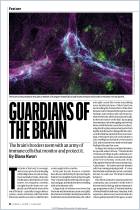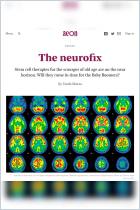
Article
The Brain Inflamed
The brain’s immune system could be provoking Alzheimer’s and other neurodegenerative diseases. Can scientists get it back in check?
Nature,
2018
Recommendation
For the last 100 years or so, conventional wisdom held that the amyloid plaques and tau tangles seen in the brains of people with Alzheimer’s were byproducts of the horrible, traumatic neurodegeneration that characterizes the disease. But new evidence is accumulating that they in fact cause the symptoms, and that they arise because of dysregulation of the brain’s immune system. If this devastating disorder impacts your friends and family, you might find that this reversal of perspective offers a glimmer of hope.
Summary
About the Author
Alison Abbott has a PhD in Pharmacology and is the Senior European Correspondent for Nature.
Learners who read this summary also read
Book
Article
Article
Article

















Comment on this summary or Start Discussion